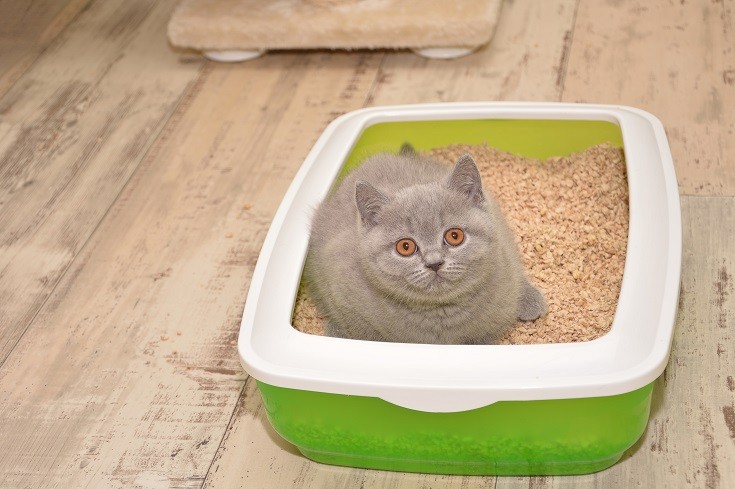
Cats are easy to potty train, as they naturally gravitate to a place for relief that will not interfere with their everyday activities. They don’t want to use the bathroom anywhere near where they sleep, eat, or play, for instance.
However, there might be times when your cat just lies in their litter box, even in areas where they have relieved themselves. There happen to be a few reasons that your cat might start exhibiting this behavior.
The 6 Reasons Cats Lay in the Litter Box
1. They’re Trying to Reduce Stress Levels
If your kitty has experienced a significant change, like moving to a new house or living with a new household pet, chances are that they are trying to find a way to deal with the stress that comes with sharing or establishing new territory. Until your cat feels comfortable again in their own household domain, they might be found lying in their litter box, where their scents are most powerful and where they feel like they have dominated the space. They don’t want to spend time in any place that they don’t feel is theirs completely.
The Solution: To get your cat to stop lying in their litter box when they’re feeling stressed out, create a comfortable and safe space for them to hang out, where people and other animals are not constantly moving through. Once they feel safe in these surroundings, their stress levels should reduce, and they should naturally start to make more of an appearance in the family environment.
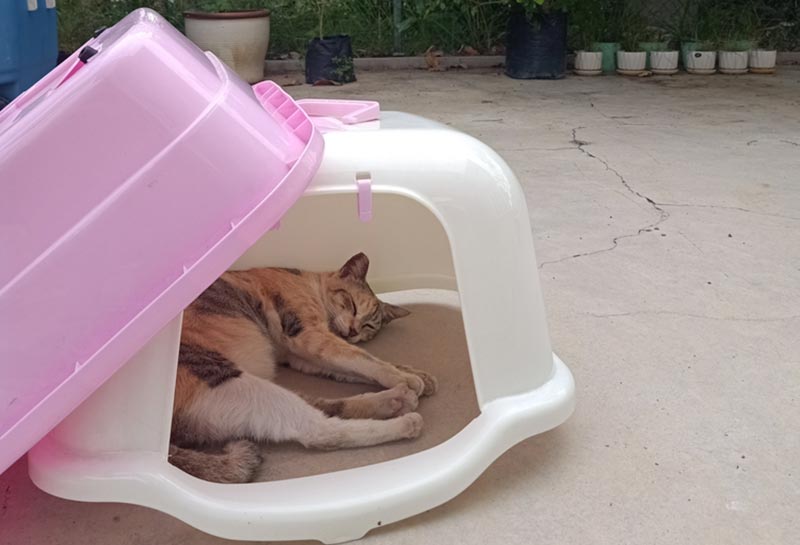
2. They Are Marking and Defending Their Territory
Some cats like to make sure their domains are never compromised by another person or animal. If your kitty is new to your family or is required to accept another cat or dog into the household, they may use their litter box to mark and defend their territory.
This behavior is most common in cats that have not been spayed or neutered. Male cats are notorious for marking and defending their territory. However, any cat might display this behavior.
The Solution: Give your cat another space to “mark and defend,” such as a kennel with a comfortable bed inside. You may have to wash the bedding due to marking, but the kennel will keep your cat from hanging out in a feces- and urine-infested space. Eventually, your cat should feel comfortable sharing your house with the help of treats, training, and encouragement.
3. They Are Dealing With a Health Problem
Sometimes, a cat can be working to heal an injury or illness or feel that the end of their life is coming. In cases like these, they might lie in their litter box to try to maintain a close “bond” with their smells and markings. Being around these scents can offer them a sense of comfort and confidence while they deal with their health problems.
The Solution: Take your kitty to the veterinarian to find out why they are feeling down. With any luck, it’s nothing more serious than a cold that can be cured with rest and hydration. Otherwise, you might have to use methods that your vet recommends for making your kitty more comfortable during the end of their lifetime.
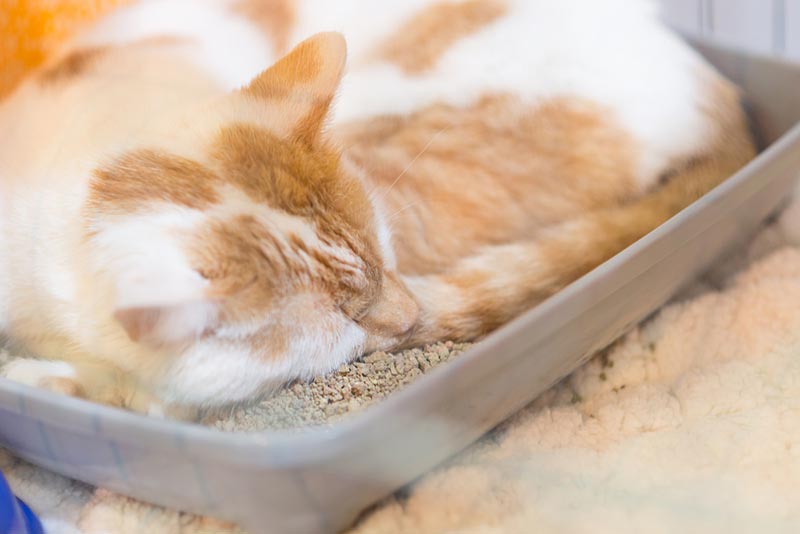
4. They Are Pregnant With Kittens
Females that have not been spayed can get pregnant, even if they’re living strictly indoors. If they are not living with an unneutered cat, they might get outside for a few minutes and become pregnant by a stray male. If your cat becomes pregnant, she may start to lie in her litter box to prepare for her new brood of kittens. She’s trying to give birth in a place that makes her feel comfortable and in control, and to her, a litter box will keep the kittens contained in a safe space until they can see, explore, and eat on their own.
The Solution: Give your pregnant cat a safe, clean place to have her babies, like a box or kennel with bedding. Make sure the birthing space is comfortable and has walls high enough to keep new kittens inside. If necessary, place the prepared box or kennel next to the litter box to make your female feel the most confident.
5. They Are Having Digestive Difficulties
Some cats have problems with their digestive system, especially as they get older. If they eat something that they are not used to, they eat too much, or they have some kind of gastrointestinal condition that inhibits proper digestion, they might want to spend more time around the bathroom than normal. For example, constipation can make a cat feel like they have to go to the bathroom for hours before they can actually go. In this case, they might stick around their litter box until the “deed” happens.
The Solution: Set up a basic food regimen that includes nothing more than your cat’s regular mealtime recipe, whether that’s commercial or homemade food. Avoid treats and extra snacks. If the digestive problems don’t subside within a couple of days, contact your veterinarian to schedule a checkup.
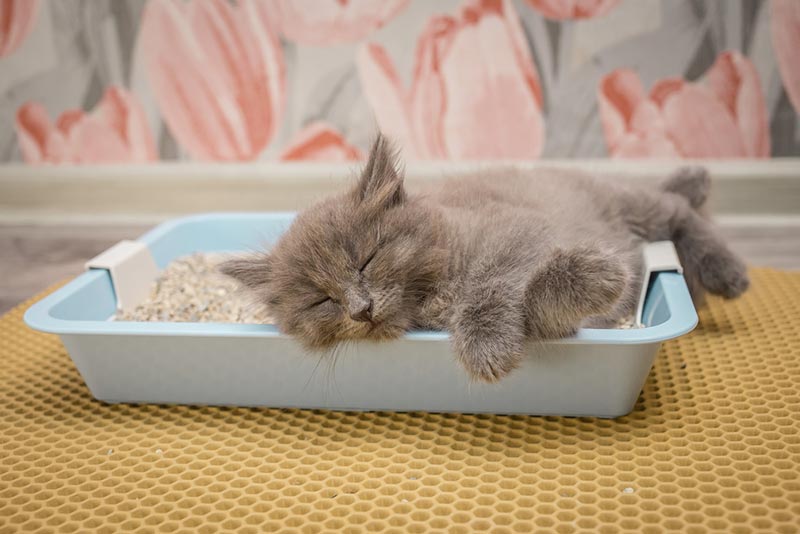
6. They’re Too Old to Go Too Far From the Bathroom
When cats get old, they are less likely to be able to manage their bathroom habits. Some cats cannot hold their feces and/or urine for long enough to reach a litter box. If they realize this, they might spend most of their time lying in their litter box to ensure that they don’t have any accidents in the house. Sleeping in or near the litter box minimizes the risk.
The Solution: Provide your older cat with a comfortable kennel space or bed near their litter box so they feel more comfortable with being able to make it to the bathroom when they feel the need to relieve themselves. The closer their sleeping quarters are to the litter box, the less likely they will actually sleep inside.
Frequently Asked Questions (FAQ)
There are a few common questions that people have when it comes to their cat lying in the litter box. Here are the accompanying answers to peruse.
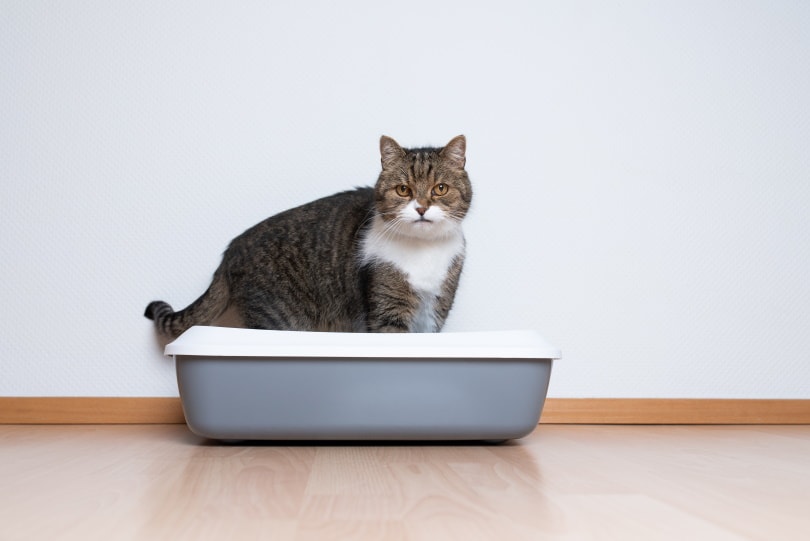
Can a Cat’s Behavior Be Changed Once They Start Lying in Their Litter Box?
Yes! It takes patience and adjustments, but figuring out how to meet your cat’s needs is all that it should take to stop them from lying in their litter box.
What If I Can’t Figure Out Why My Cat Is Lying in the Litter Box?
It’s a good idea to schedule a checkup appointment with your veterinarian to rule out any health conditions that could be causing the behavior. If everything checks out, your vet may be able to help you determine the reason (which may have to do with their quality of life) so you can effectively address the situation.
Can a Different Type of Litter Box Fix the Problem?
Switching to a litter box with a cover and/or high sidewalls can help deter your cat from wanting to get inside and lie down in the litter. However, if there is a reason for this behavior other than it just being a weird habit, a different type of box may not fix the problem.
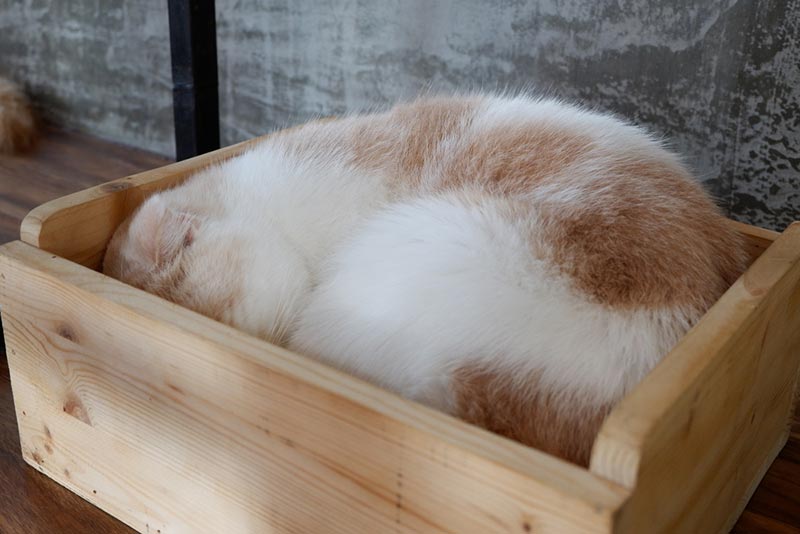
 Conclusion
Conclusion
There are several reasons that your cat might be lying in their litter box. The key is to figure out what’s driving your cat to adopt this behavior so you can get to the root of the problem and address it healthily and safely. Don’t hesitate to reach out to your veterinarian about any questions and concerns that you have.
See also:
- Why Does My Cat Play in the Litter Box? 5 Reasons for This Behavior
- Can Bearded Dragons Eat Potatoes? Vet Approved Nutritional Guide
Featured Image Credit: Lilia Solonari, Shutterstock





